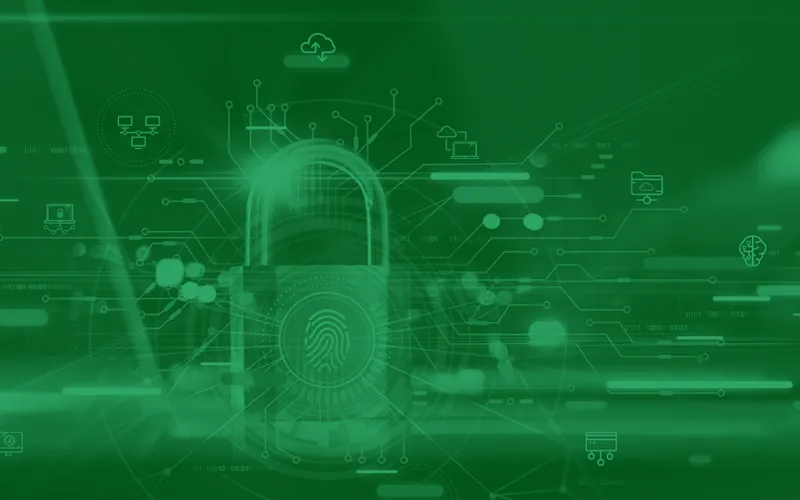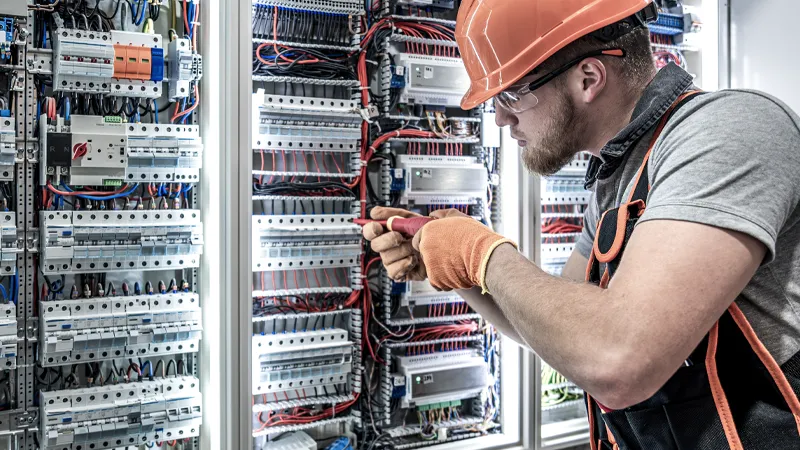
by Paul Wheaton
September 16, 2024
Share Article
Construction estimators are now finding themselves more dependent on digital technology and software systems than ever before.
Many companies use digital tools, such as emails and smartphones, to regularly transfer work-related data and information.
However, as technology becomes more tied to work, the higher the risk of being targeted by cyber-criminals.
Cyberattacks come in many shapes and forms, most often being:
- Ransomware: Using encryption to lock a victim out of their system and demanding a ransom.
- Malware: Intrusive software that disrupts digital systems.
- Phishing: Using digital communication (by posing as a trusted source) to gain access to sensitive information
- Distributed denial of service (DDoS): Overloading a system with data to freeze and disrupt access.
- Social Engineering: Influencing the victim into gaining control over their system to steal information.
These methods of attack are constantly changing and evolving, making it hard for any business to avoid costly incidents.
According to an annual cyber threat report conducted in 2023 by ReliaQuest, the construction industry was ranked as the No. 1 most targeted sector, compared to other heavily targeted industries like transportation and wholesale trade.
However, while these attacks become more sophisticated, so do means of fighting them. Using, modern technology, companies can combat these dangerous cyber threats.
Implementing cybersecurity measures, such as multi-factor authentication, backing up data and regular employee training can all be extremely helpful in preventing a cyber incident.
And, by using even more advanced technology, such as products provided by a hosted system all data transfers are securely done automatically.
With a hosted service, threats can be detected and intercepted before the threat can even reach a company.
To stay safe and protect a company form serious financial damage, using cybersecurity technology is vital.
Data Vulnerabilities of the Construction Industry
Since the structure of the construction industry is so unique, there is a high threat level of being targeted by cyberattacks.
Even though technology has become more and more integral to the efficiency and processes of construction, many companies still lack cybersecurity measures.
This is mostly due to the fast evolution of new technologies which many companies cannot keep up with, with some just beginning to implement digital processes.
What makes the construction industry particularly vulnerable is:
- The frequent transfer of sensitive information, such as blueprints, client, financial and personal information, which can all be stolen or used as ransom.
- The unique structure of construction, with many remote workers (on site) and office locations, constantly communicating through digital networks and mobile devices such as emails and texts.
- Being an industry with a historically low perception of risk regarding cyber threats. Many contractors or workers underestimate how big of a target they are, leading to underinvestment in protective measures.
- The complexity of the industry, involving many different possible points of failure, such as subcontractors, suppliers, clients and workers.
All these factors create an enticing sector that cyber criminals can’t pass up. The outcomes, of these attacks can also be extremely damaging to any business.
How Cyberattacks can Damage Your Construction Business
When a construction company falls victim to a cyberattack, there are significant negative impacts.
Operation disruption, such as loss of data and project delays can severely cripple a companies’ work.
Cyberattacks achieve this by hijacking and forcibly shutting down systems and stealing valuable data, leaving a company stuck in costly downtime or recovery.
Without cyber-defense, a company is left vulnerable to financial losses, as cyberattacks can lead to ransom payments, hefty recovery costs and potential fines or legal fees.
If a cyber-attacker obtains intellectual property, such as custom designs, blueprints, or sensitive information, a company could lose valuable labor and any competitive advantage over other construction businesses.
Furthermore, a company can face serious reputational damage. Current clients may lose trust in the security of the company, as well as any future clients.
Clients may even pursue legal action, if their data has been compromised and the construction company failed to meet contractual obligations to keep that data secure.
This makes having cybersecurity extremely important, as without them, a company is at risk.
Using Modern Technology to Combat Cyberattacks
All construction businesses should make some investment into broad cybersecurity, such as:
- Network firewalls
- Antivirus & Anti-Malware software
- Data backups
- User authentication
- Spam filtering and email encryption
- Security awareness training
However, because modern technology is always improving, there are a wide variety of advanced cybersecurity options.
These advanced measures can not only protect a company against current cyber threats, but also stay proactive for future methods of attack.
In addition to broad security standards mentioned above, new technologies, such as artificial intelligence, can be used for real-time threat detection and response.
- With AI, threats can be predicted and analyzed, keeping companies on top of the game with cybersecurity.
Automation can also be an invaluable tool, making every process of keeping a company cyber-safe even easier. With built-in updates and incident responses.
Biometric and multi-factor authentication (MFA) can ensure that even if passwords are compromised, additional security layers, such as facial recognition or fingerprints, will prevent a cyberattack from being successful.
With enhanced data encryption and storage, security systems can ensure that all sensitive information will remain secure even while being transferred. Data loss prevention (DLP) prevents unauthorized sharing of any confidential information.
If an attack does occur, advanced decryption can also be used to intercept ransomware threats. File encryption keys can be intercepted during an attack so that the cyber-attacker has nothing to bargain with.
With mobile cloud-based options, all these security systems can be managed and optimized, reducing the risk of vulnerability.
Employee training can also be automated and tracked, protecting the company through the first line of defense.
If companies are proactive with their approach to cybersecurity, such as investing in modern technology, the result will be more client trust and an edge over the competition.
Types of Cyber-Security Solutions
When it comes to implementing cybersecurity systems, companies can use two options of housing a cybersecurity system.
With on-premises solutions, the system is installed and managed locally with the company, who is responsible for all maintenance.
Some of the benefits of having an on-prem security system includes:
- Complete control and customization of the system.
- Keeps all data within the company’s premises.
- Reduced latency with no need to transfer data over the internet.
- Can be easily integrated with existing systems.
While on-premises security solutions can be useful for construction companies that need absolute control over their data, there are still some drawbacks.
On-prem systems can often be very expensive, with very little flexibility, especially as company grows or shifts sizes.
Maintenance can be very complex, requiring skilled technicians to keep the systems in check.
Additionally, on-prem options provide less availability for remote access, which may not be optimal for construction companies with a large on-site workforce.
By contrast, hosted security options can provide solutions with:
- Cloud-based services that can be accessed remotely through secure networks
- Managed by third party provider that covers all maintenance, often making the services much cheaper and hassle free.
- Models of scalability to fit any type of construction company for their needs, with levels of subscription.
- Services will stay up to date with automation, keeping operations running smoothly without interruption.
- Disaster recovery plans that ensure that in the event of an incident, all data can be quickly restored.
While choosing to use a hosted product may result in more dependency on a third party and the use of internet, it is typically the best option for most construction companies who don’t want to deal with the hassle of maintaining their own system.
Customizing Digital Defense With Hosted Products
To begin finding the right security product for any company, they must evaluate their security needs.
Many construction businesses do not need advanced tools or may not have the budget to afford them.
While other companies may already have an IT department, which could be further empowered by a using third-party security system.
Hosted products, however, are entirely scalable to any companies needs or resources, offering a variety of subscription levels tailored to fit the structure of that business.
Large companies can leverage advanced hosted tools to manage their complexity, while smaller local business may only need low-level security measures in place.
With the flexibility of a cloud-based third-party system, all workers can have easy access to training, with continuous support.
Even though hosted cybersecurity options are maintained by the providers, plans can still be customized and designed around the structure of your business.
Keep Construction Data Safe With McCormick Hosted
The construction sector is more vulnerable to being targeted by cybercriminals due to its unique structure, lack of security and desirable intellectual property.
Cyber-attackers will utilize any means to steal or hold valuable data hostage, such as phishing or ransomware.
If construction companies fall for these traps, the outcomes can be severe, such as financial loss, long projects delays and loss of client trust.
However, cyberattacks evolve, so too does defensive technology, which can be used to prevent and predict vicious online threats.
Even by implementing basic system protection, such as firewalls, backups and worker training, the risk of cyberattacks succeeding is reduced drastically.
With advanced technology, such as hosted cybersecurity solutions, companies can have access to a full arsenal of defensive measures, ready to not only prevent harmful incidents but also predict them and intercept them.
At McCormick, keeping your construction company safe with hosted security products has never been simpler.
With our McCormick Hosted — the cloud-based version of our estimating software —we’re ready to help you fight cyberattacks with advanced technology and personal support.
Chat with a specialist to learn more!

Speed Up Your Bids With McCormick’s Built-In Takeoff Tool

